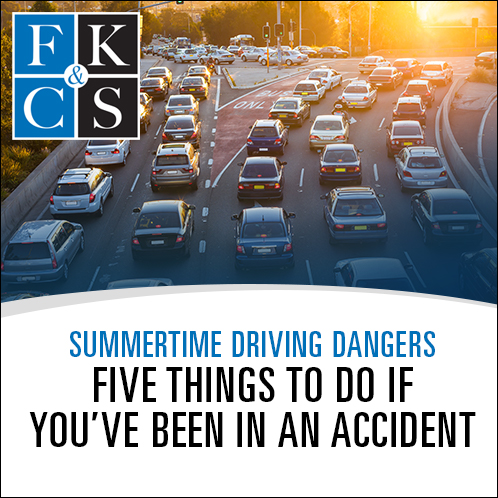
Pool covers are coming off, schools are winding down, ice cream shops and drive-in movie theaters are packed with families and the roadways are filling up with excited vacationers. Summertime is here!
While warm weather and time off for much-needed rest and relaxation are welcomed thoughts, there’s a lingering danger in these warm summer months. According to the National Highway Traffic Safety Administration (NHTSA), more fatal traffic accidents occur in the summer, July being the worst. Fatalities are also higher on weekends and in the evening hours, while Independence Day tops the charts for highest vehicular-related death toll on a single day.
Despite its cold and often inclement weather, winter is not the most dangerous time to be on the roadways. During the summer, more teens are out of school and driving around, scorching temperatures cause tires to blow out and engines to overheat, roads become congested with tourists flocking to their vacation destinations and roadwork makes getting around more difficult. Ultimately, more people on the road means heightened chances for an accident to occur.
To stay safe when driving, always wear your seatbelt, do not text and drive, obey the speed limit, ensure that your car is inspected before traveling and never drink and drive. If you should get into an accident, here are five steps to take:
- Stay put and call 911: If you have just been in an accident, stay put and call 911. Fleeing the scene or moving your vehicle to a safer location disrupts the accident scene and can ultimately hurt your case, especially if you are not at fault in the situation.
- Take pictures of the scene: Taking pictures and video following an accident, including different vantages points of the vehicles involved, debris, roadway, skid marks, guard rails, signage and other pieces of evidence that paint a picture of the accident scene, can help with legal matters following the accident. Be sure to take the pictures as soon as possible after an accident occurs, before anything has been altered, cleaned up or removed from the scene.
- Collect info from witnesses: Witnesses can help corroborate and explain what happened before, during or after an accident occurs. If you can gather their contact information before they leave the scene of the accident, be sure to do so.
- File paperwork: Be sure to file insurance paperwork right away and consult with your attorney regarding legal matters. There are a variety of forms that may need to be filed in relative short order, which is one reason to consult with an attorney sooner rather than later.
- Call a lawyer: Calling an attorney who is experienced in personal injury law as soon as possible following an accident is crucial to the strength of your case. When you contact an attorney early on, they are usually able to investigate and gather evidence such as surveillance footage and black box data from vehicles, which needs to be collected before they are destroyed or erased.
If you or a loved one has been injured in an accident, call us for a free consultation with one of our attorneys, (845) 897-5199.
Sources: https://www-fars.nhtsa.dot.gov/Crashes/CrashesTime.aspx, https://www.iihs.org/api/datastoredocument/status-report/pdf/52/3

